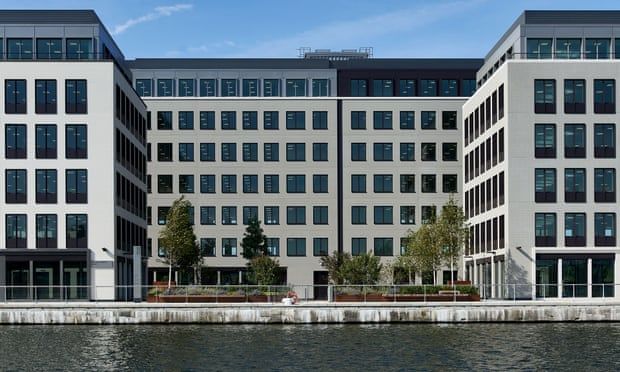
Boris Johnson’s flagship London dock scheme on brink of collapse
In May 2013, Boris Johnson announced a flagship £1.7bn scheme for Chinese investors to transform east London docks into the capital’s third financial district.
It was the biggest commercial property deal he had announced during his time as London mayor and he pledged it would be a “beacon for eastern investors”.
While Johnson’s proposals for a new island airport in the Thames estuary and a new bridge linking Scotland and Northern Ireland never got off the ground, he hoped the Royal Albert Dock project would boost his mayoral legacy.
Despite the grand ambitions, residents say there has been no significant work at the 35-acre industrial site for more than two years and the scheme now appears on the brink of collapse.
The Greater London Authority (GLA) confirmed last week a “final termination notice” had been served on the developer because of delays. The authority also said receivers have been appointed over six companies within the group structure of the developer.
Unmesh Desai, a Labour London Assembly member who represents east London, said: “This was meant to be a jewel in the crown for east London and it’s now a ghost town.
“It’s bitterly disappointing and we need to establish what has gone wrong and whether the proper due diligence was done on the project.”
There were concerns when City Hall first announced the project about its profitability, but it was hoped there would be a plentiful supply of Chinese funds to ensure its success.
Johnson said at the time the commercial, retail and leisure complex on publicly owned land was intended to create thousands of jobs and bring in billions of pounds of investment for the UK economy. He said the 19th-century docks and waterways were once again be the “arteries of trade and commerce”.
 There has been no significant work at the 35-acre Royal Albert Dock site for more than two years.
There has been no significant work at the 35-acre Royal Albert Dock site for more than two years.
The project was headed by charismatic property developer Xu Weiping, head of the developer ABP (London) Investment Ltd. According to a profile in Moneyweek, he started out designing knitting machines before working as a civil servant in Beijing. His previous development experience was mainly limited to a large development in one of Beijing’s least affluent areas.
In an interview in November 2013, Weiping – who was described as often being driven around in a red Bentley and owning a collection of luxury watches - admitted he did not yet have all of the money for the project. “There’s no need for me to prepare £1bn in cash,” he said. “The market is quite good.”
When Chinese president Xi Jinping made a state visit to Britain in October 2015, famously enjoying a pint of beer at a Buckinghamshire pub with then prime minister David Cameron, he presided over a new signing deal for fresh investment in the Royal Albert Dock project.
In 2019, Weiping admitted the project was struggling. He said there had been an adverse impact on marketing and letting for the project because of uncertainty around Brexit. He said his development company was reviewing the future of the scheme.
The latest accounts for ABP (London) Investment Ltd, the property developer for Royal Albert Dock, said its parent company was trying to raise further funds for the project. The accounts state there is uncertainty whether this is possible and “this may cast significant doubt about the company’s ability to continue as a going concern”. Another company involved in the development, also controlled by Weiping, says in its accounts it has failed to make contracted repayments on a £99m bank loan.
A GLA spokesperson said: “The GLA has been concerned for some time by the lack of progress by the developer at Royal Albert Dock and served ABP with a Final Termination Notice in August after the developer proved unable to meet all of its obligations …for delivery of this scheme.”
It said ABP’s guarantor, Dauphin Holdings Group, also controlled by Weiping, had now formally stepped into the project. It is understood the Chinese-backed developer is likely to be removed from the project later this year unless it complies with the delivery schedule and contract.
The GLA said the scheme was being delivered in six phases and most of phase one, comprising 560,000 square feet of office and retail space, was completed in April 2019. It says since this time “no significant activity, lettings or investment has been undertaken by ABP”. It said most of the group was not in insolvency, but Deloitte had been appointed as receivers over six companies within the ABP group structure. Deloitte declined to comment.
The standstill on the work is likely to lead to demands for an investigation into how the deal was structured and approved. A Channel 4 investigation in November 2014 raised questions over whether more robust checks should have been conducted on the ABP business before agreeing the deal.
Caroline Pidgeon, a Liberal Democrat London Assembly member, said: “Boris Johnson’s record as mayor of London often seemed as though he thought that vital rules of fairness in procurement and setting of contracts were something he could ignore. His record … should be examined as closely as his record as prime minister.”
ABP (London) Investment Ltd did not respond to a request for comment.











